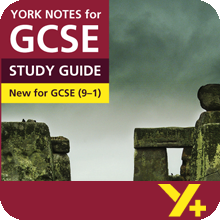Your Assessment
Read through the answer below and decide what grade to give it. Use the Hints & Tips to help you make your assessment.
Question: Read from Act II Scene 2 ‘Methought I heard a voice cry, “Sleep no more ...”’ (line 38) to ‘Look on’t again, I dare not’ (line 55). In this scene, Macbeth has just returned from killing Duncan.
Starting with this speech, explore how Shakespeare presents guilt in Macbeth.
Write about:
- how Shakespeare presents ideas about guilt in this extract
- how Shakespeare presents ideas about guilt in the play as a whole.
In this extract Shakespeare shows us how Macbeth is immediately struck with guilty feelings following the murder of Duncan. He thinks he ‘heard a voice cry, “Sleep no more!”’ This suggests that guilt has resulted in Macbeth hearing voices. It could also imply that he hears his own conscience condemning him for his actions.
Macbeth refers to ‘sleep’ repeatedly in this extract. This repetition has the effect of making him seem distracted: he can only think about how he will never sleep again. Sleep is a key motif in the play and will return as evidence of Macbeth’s guilt in later scenes. For example in Act III he talks about the ‘terrible dreams’ (III.2) he is tormented with. This shows how his fears are confirmed and following the murder his guilt prevents him from sleeping.
The extent of Macbeth’s guilt is due to the fact that, not only has he committed murder, but he has also murdered the king. When Shakespeare wrote the play, society generally believed in the Divine Right of Kings. This meant that the king was directly in line to God. The murder of Duncan is more dreadful because of this. The Macbeths are utterly immoral in their actions and so the guilt they suffer could be interpreted as damnation by God.
Macbeth is so disturbed that he only carries out part of their plan and forgets to leave the daggers on the guards. This could also show his guilt because he has done the deed and then forgotten what comes next. Lady Macbeth has to take charge and return the daggers herself. At this point in the play she seems more focused on the crime than Macbeth, though we later see the destructive effects of this guilt more visibly in her.
Later when he wants Banquo to be killed, Macbeth doesn’t do it himself, but employs murderers to do it. This could be because he knows the lasting effects of guilt and doesn’t want to go there again. He wants Banquo’s son, Fleance, to be killed as well because he is paranoid about the prophecies.
On the other hand, Lady Macbeth seems undisturbed in this extract, and in fact takes charge of the situation. She uses commanding language saying ‘Go, get some water’ and demanding that her husband clean away ‘this filthy witness’. The word ‘witness’ shows that the blood on Macbeth’s hand is visible evidence of his guilt. She takes charge, making her ‘brave’ husband seem weak. Historically women were considered the weaker sex, yet Lady Macbeth takes control here and is presented as stronger than Macbeth.
This scene links to the later scene when we see Lady Macbeth’s demise. The plan does not work out as she had hoped and her own sleep is upset by her guilt. We see her sleepwalking and making futile attempts to wash a ‘damned spot’ from her hands. There is irony here as she had previously told her husband that some water would be enough to clean them. The ‘spot’ represents guilt that cannot be washed out. The Macbeths own knowledge of their crime results in them being ‘damned’.
In conclusion, this extract shows some significant examples of guilt that are further developed throughout the play, particularly in the motifs of blood and disturbed sleep.
